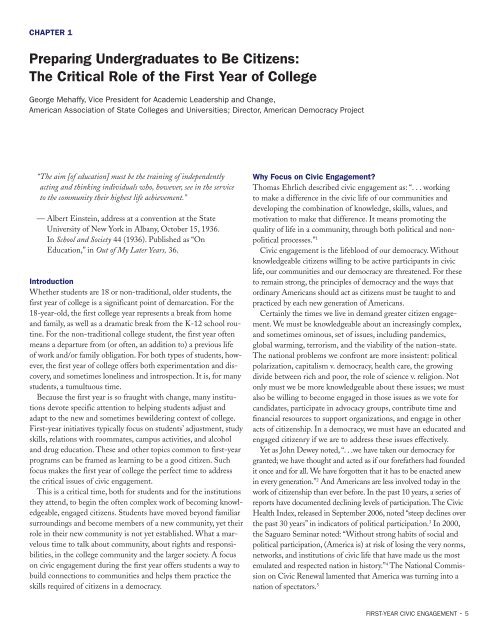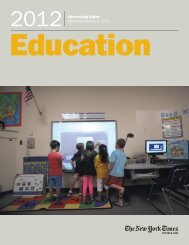Requiring civic engagement demonstrates how much we valueit, <strong>for</strong> students and <strong>for</strong> democracy. Certainly new college studentsare even busier than they had anticipated. To meet college costs,many must work more hours than they had anticipated. For some,college is more difficult than anticipated and requires more studytime. Integrating civic engagement into first-year curricula establishesits place in the competition <strong>for</strong> students’ time. I believethat within our curricula, we must encourage, inspire, and requirea significant investment of students’ time in civic engagement.Surely we can and must do better.A New Call <strong>for</strong> the <strong>First</strong>-<strong>Year</strong> ExperienceFor almost three decades, first-year experience programs havefocused on students’ success as they begin college. The diversityof our programs serves many different kinds of students in manytypes of institutions. The evolution of our programs brings us to areadiness <strong>for</strong> renewed idealism and focus, and I believe requiringcivic engagement in the first college year can center us, with greatbenefit to our students, institutions, communities, and country.For higher education, civic engagement has to be the new“what’s next” in the first year. The first-year movement needsa set of more aspirational goals and desired outcomes from thefoundation of the college experience. Higher education operateswith both ideals and practicalities. Too often institutions see thefirst year too narrowly — in a retention model, a revenue model.That paradigm argues that the significant loss of new studentsthrough attrition is a business/ financial loss and that this loss canbe stemmed by having all employees adopt more business-like attitudesand practices toward the care and feeding of new students.I see civic engagement as the rallying cry to move us beyondthis business model to renewed ideals <strong>for</strong> the first college year.As a central theme and an organizing structure <strong>for</strong> curricula andco-curricula, it challenges students to think critically about realworldissues, encourages active learning, and asks them to reflecton values.<strong>Civic</strong> engagement returns us to the original purpose of Americanhigher education: development of leaders and civic improvement.From the societal perspective, what could be moreimportant? Every society has systems and pipelines <strong>for</strong> leadershippreparation: the church, the military, the practice of certain occupations.Starting with the Colonial college, this importantregenerative task has also been the work of higher education. InAmerica, especially now, higher education assumes this role.<strong>Civic</strong> engagement in first-year instruction suggests that highereducation is about moving this next generation of college studentsinto the important roles of improving communities <strong>for</strong> thegreater good of all, not just <strong>for</strong> individual benefits. Opposing amore utilitarian and less intellectual, even anti-intellectual, view ofthe purposes of college, higher education can tend to the developmentof societal leaders who are intellectual, rational, philosophical,and civic-minded. We can re-claim the ideals of higher education.We must do this beginning in students’ first year.<strong>Civic</strong> engagement can continue to strengthen the historic andmutually beneficial bonds between campus and community.Especially in communities where town/gown relations may havebecome strained over time, civic engagement offers great promise<strong>for</strong> improving those relations. Many communities hope collegestudents will be future residents and use their energy and talents<strong>for</strong> the betterment of the community.It’s high time we gave back, some would argue. We of the academyare always asking <strong>for</strong> money, from local, regional, state, andnational communities. Leaders at many levels — cabinet-level officers,deans, department chairs, individual faculty — have all had tobecome fund-raisers. We are perceived in some quarters (particularlyin state legislatures) to have insatiable appetites <strong>for</strong> resources.We are perceived by some to have an entitlement mentality. <strong>Civic</strong>engagement gives us a wonderful opportunity to give back to thevery communities we are constantly soliciting.<strong>First</strong>-<strong>Year</strong> <strong>Civic</strong> <strong>Engagement</strong>: Now and NextThis monograph’s chapters and case studies present resourcesand models that can help us do better. We can and must moveour programs <strong>for</strong> the first year of college from a retention or businessmodel to a center of ideals <strong>for</strong> academic excellence and civiclife. George Mehaffy’s chapter leads and introduces the chaptersby other higher education and civic engagement leaders. BetsyBarefoot’s chapter introduces and analyzes the case studies. Thecase studies show what can happen when colleges and universitiesintentionally introduce first-year students to the concepts andpractice of civic engagement. Following those, my closing chapterproposes action steps to make civic engagement the new “what’snext” <strong>for</strong> the first year. With idealism and purpose, we can do better!WORK CITEDPolicy Center on the <strong>First</strong> <strong>Year</strong> of <strong>College</strong>. (2002). Second National Survey of<strong>First</strong>-<strong>Year</strong> Academic Practices.(http://www.firstyear.org/survey/survey2002/index.html)
CHAPTER 1Preparing Undergraduates to Be Citizens:The Critical Role of the <strong>First</strong> <strong>Year</strong> of <strong>College</strong>George Mehaffy, Vice President <strong>for</strong> Academic Leadership and Change,American Association of State <strong>College</strong>s and Universities; Director, American Democracy Project“ The aim [of education] must be the training of independentlyacting and thinking individuals who, however, see in the serviceto the community their highest life achievement.”— Albert Einstein, address at a convention at the StateUniversity of New York in Albany, October 15, 1936.In School and Society 44 (1936). Published as “OnEducation,” in Out of My Later <strong>Year</strong>s, 36.IntroductionWhether students are 18 or non-traditional, older students, thefirst year of college is a significant point of demarcation. For the18-year-old, the first college year represents a break from homeand family, as well as a dramatic break from the K-12 school routine.For the non-traditional college student, the first year oftenmeans a departure from (or often, an addition to) a previous lifeof work and/or family obligation. For both types of students, however,the first year of college offers both experimentation and discovery,and sometimes loneliness and introspection. It is, <strong>for</strong> manystudents, a tumultuous time.Because the first year is so fraught with change, many institutionsdevote specific attention to helping students adjust andadapt to the new and sometimes bewildering context of college.<strong>First</strong>-year initiatives typically focus on students’ adjustment, studyskills, relations with roommates, campus activities, and alcoholand drug education. These and other topics common to first-yearprograms can be framed as learning to be a good citizen. Suchfocus makes the first year of college the perfect time to addressthe critical issues of civic engagement.This is a critical time, both <strong>for</strong> students and <strong>for</strong> the institutionsthey attend, to begin the often complex work of becoming knowledgeable,engaged citizens. Students have moved beyond familiarsurroundings and become members of a new community, yet theirrole in their new community is not yet established. What a marveloustime to talk about community, about rights and responsibilities,in the college community and the larger society. A focuson civic engagement during the first year offers students a way tobuild connections to communities and helps them practice theskills required of citizens in a democracy.Why Focus on <strong>Civic</strong> <strong>Engagement</strong>?Thomas Ehrlich described civic engagement as: “. . . workingto make a difference in the civic life of our communities anddeveloping the combination of knowledge, skills, values, andmotivation to make that difference. It means promoting thequality of life in a community, through both political and nonpoliticalprocesses.” 1<strong>Civic</strong> engagement is the lifeblood of our democracy. Withoutknowledgeable citizens willing to be active participants in civiclife, our communities and our democracy are threatened. For theseto remain strong, the principles of democracy and the ways thatordinary Americans should act as citizens must be taught to andpracticed by each new generation of Americans.Certainly the times we live in demand greater citizen engagement.We must be knowledgeable about an increasingly complex,and sometimes ominous, set of issues, including pandemics,global warming, terrorism, and the viability of the nation-state.The national problems we confront are more insistent: politicalpolarization, capitalism v. democracy, health care, the growingdivide between rich and poor, the role of science v. religion. Notonly must we be more knowledgeable about these issues; we mustalso be willing to become engaged in those issues as we vote <strong>for</strong>candidates, participate in advocacy groups, contribute time andfinancial resources to support organizations, and engage in otheracts of citizenship. In a democracy, we must have an educated andengaged citizenry if we are to address these issues effectively.Yet as John Dewey noted, “. . .we have taken our democracy <strong>for</strong>granted; we have thought and acted as if our <strong>for</strong>efathers had foundedit once and <strong>for</strong> all. We have <strong>for</strong>gotten that it has to be enacted anewin every generation.” 2 And Americans are less involved today in thework of citizenship than ever be<strong>for</strong>e. In the past 10 years, a series ofreports have documented declining levels of participation. The <strong>Civic</strong>Health Index, released in September 2006, noted “steep declines overthe past 30 years” in indicators of political participation. 3 In 2000,the Saguaro Seminar noted: “Without strong habits of social andpolitical participation, (America is) at risk of losing the very norms,networks, and institutions of civic life that have made us the mostemulated and respected nation in history.” 4 The National Commissionon <strong>Civic</strong> Renewal lamented that America was turning into anation of spectators. 5
- Page 1: First-Year Civic Engagement:Sound F
- Page 5 and 6: CONTENTSivPrefaceMartha J. LaBare,
- Page 7: Zlotkowski, Edward, ed. (2002). Ser
- Page 10 and 11: we had the “great flood” of the
- Page 14 and 15: The preparation of citizens was one
- Page 16 and 17: preparation. At its heart, this wor
- Page 18 and 19: in it of particular interest to tho
- Page 20 and 21: often in tension. Political partici
- Page 22 and 23: educating students for active citiz
- Page 24 and 25: CHAPTER 4Civic Learning: Aligning P
- Page 26 and 27: Faces/Phases of CitizenshipFace/Pha
- Page 28 and 29: ecome more informed and participate
- Page 30 and 31: ReferencesAstin, A.W., Vogelgesang,
- Page 32 and 33: photography techniques to inmates a
- Page 34 and 35: CHAPTER 8Action Steps to Move theFi
- Page 36 and 37: ConclusionI wish to be very clear t
- Page 38 and 39: CASE STUDYALLEGHENY COLLEGECivic En
- Page 40 and 41: CASE STUDYANTIOCH COLLEGECivic Enga
- Page 42 and 43: CASE STUDYCALIFORNIA STATE UNIVERSI
- Page 44 and 45: CASE STUDYCALIFORNIA STATE UNIVERSI
- Page 46 and 47: CASE STUDYCHANDLER-GILBERT COMMUNIT
- Page 48 and 49: CGCC Global Engagement:http://www.c
- Page 50 and 51: student blog in which students are
- Page 52 and 53: CASE STUDYTHE COLLEGE OF NEW JERSEY
- Page 54 and 55: I. Contributors’ Names and Contac
- Page 56 and 57: opportunities of CSU students and C
- Page 58 and 59: needs, and expectations of the serv
- Page 60 and 61: Although Times Talk began in Septem
- Page 62 and 63:
CASE STUDYFRANKLIN PIERCE UNIVERSIT
- Page 64 and 65:
We now have a comprehensive assessm
- Page 66 and 67:
Another major assignment for this c
- Page 68 and 69:
CASE STUDYHAMPDEN-SYDNEY COLLEGELiv
- Page 70 and 71:
I. Contributors’ Names and Contac
- Page 72 and 73:
Qualitative assessment begins with
- Page 74 and 75:
3. Lessons in Democracy. The IUPUI
- Page 76 and 77:
CASE STUDYLEHIGH UNIVERSITYJudging
- Page 78 and 79:
CASE STUDYMARS HILL COLLEGELifeWork
- Page 80 and 81:
CASE STUDYMERCER UNIVERSITYInterdis
- Page 82 and 83:
CASE STUDYMICHIGAN STATE UNIVERSITY
- Page 84 and 85:
CASE STUDYPACE UNIVERSITYCivic Enga
- Page 86 and 87:
Susan-Feather GannonProfessor, Tech
- Page 88 and 89:
AssessmentData were gathered from s
- Page 90 and 91:
CASE STUDYPITZER COLLEGEThe Communi
- Page 92 and 93:
from people different from themselv
- Page 94 and 95:
Table 1Summary of the Major Outcome
- Page 96 and 97:
engaged stewards of the environment
- Page 98 and 99:
HIV-positive individuals. They also
- Page 100 and 101:
Students were then equipped to eval
- Page 102 and 103:
the World Affairs Council (WAC), in
- Page 104 and 105:
CASE STUDYTRINITY UNIVERSITYCivic E
- Page 106 and 107:
I. Contributors’ Names and Contac
- Page 108 and 109:
in the organization of health care
- Page 110 and 111:
study and a series of retreats as p
- Page 112 and 113:
ing based opportunities. Both semes
- Page 114 and 115:
engaging first-year students and st
- Page 116 and 117:
CASE STUDYWEBER STATE UNIVERSITY CO







